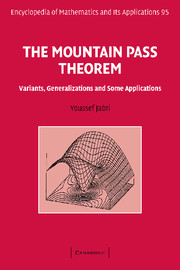Book contents
- Frontmatter
- Contents
- Introduction
- 1 Retrospective
- I First Steps Toward the Mountains
- II Reaching the Mountain Pass Through Easy Climbs
- III A Deeper Insight in Mountains Topology
- IV The Landscape Becoming Less Smooth
- V Speculating about the Mountain Pass Geometry
- VI Technical Climbs
- A Background Material
- Bibliography
- Index
1 - Retrospective
Published online by Cambridge University Press: 04 September 2009
- Frontmatter
- Contents
- Introduction
- 1 Retrospective
- I First Steps Toward the Mountains
- II Reaching the Mountain Pass Through Easy Climbs
- III A Deeper Insight in Mountains Topology
- IV The Landscape Becoming Less Smooth
- V Speculating about the Mountain Pass Geometry
- VI Technical Climbs
- A Background Material
- Bibliography
- Index
Summary
… it was Riemann who aroused great interest in them [problems of the calculus of variations] by proving many interesting results in function theory by assuming Dirichlet's principle …
C.B. Morrey Jr., Multiple integrals in the calculus of variations, Springer-Verlag, 1966.Variational and topological methods have proved to be powerful tools in the resolution of concrete nonlinear boundary value problems appearing in many disciplines where classical methods may fail. This is the case in particular for critical point theory, which became very successful these past years. Its success is due, in addition to its theoretical interest, to the large number of problems it handles.
To understand how the interest arose in this discipline, let us recall some of the main evolutions of its underlying principles in a series of historical events.
An Algorithm for Finding Extrema by Fermat
In a pure chronological order, the first variational treatments may be traced to the Greeks, who were interested in isoperimetric problems. Hero of Alexandria discovered in 125 b.c. that the light reflected by a mirror follows the shortest possible path. Fermat proved in 1650 that the light follows the path that takes the least time to go from one point to an other.
- Type
- Chapter
- Information
- The Mountain Pass TheoremVariants, Generalizations and Some Applications, pp. 7 - 12Publisher: Cambridge University PressPrint publication year: 2003

